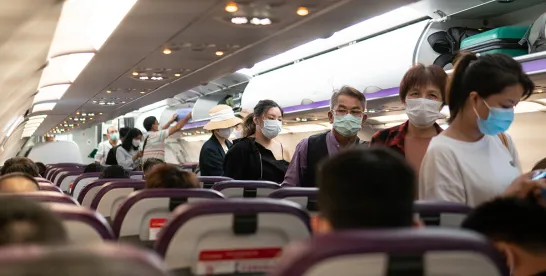The spread of coronavirus disease 2019 (COVID-19) throughout the world is increasing the impact to multiple areas of immigration and compliance law in the U.S.
The following government agencies are referenced in this briefing: the Department of Homeland Security (DHS) and the Department of State (DOS); DHS includes the U.S. Citizenship and Immigration Services (USCIS), U.S. Customs and Border Protection (CBP), and U.S. Immigration and Customs Enforcement (ICE); and DOS includes U.S. Embassies and Consulates.
Presidential Proclamations and Implementation: Suspension of Entry of Certain Persons Who Pose a Risk of Transmitting Coronavirus Disease 2019
In efforts to combat the spread of COVID-19, presidential proclamations were issued on January 31st, February 29th, and March 11th temporarily suspending entry into the U.S. The suspension applies to non-U.S. citizen travelers, with limited exceptions, who were physically present in specific countries during the 14-day period preceding entry or attempted entry into the U.S. CBP implementation of related policies and procedures at U.S. entry points is continuously being updated.
The initial January 31st proclamation suspension applies to travelers who were physically present within China, excluding Hong Kong and Macau. Exempt individuals and U.S. citizens who travel from the Hubei province are subject to up to 14 days of mandatory quarantine, and those who visited other parts of mainland China are subject to monitoring at specific ports of entry and potential self-quarantine at home. The February 29th proclamation adds to the suspension travelers who were physically present within the Islamic Republic of Iran, and the March 11th suspension adds the 26 countries in the Schengen area of Europe: Austria, Belgium, Czech Republic, Denmark, Estonia, Finland, France, Germany, Greece, Hungary, Iceland, Italy, Latvia, Liechtenstein, Lithuania, Luxembourg, Malta, Netherlands, Norway, Poland, Portugal, Slovakia, Slovenia, Spain, Sweden, and Switzerland. Beginning March 16th the suspension also applies to travelers from the United Kingdom and Ireland. Other countries may be added to the suspension, which is expected to be in place for at least 30 days.
The suspension does not apply to the following individuals:
-
U.S. Citizens and Lawful Permanent Residents;
-
Spouse of U.S. Citizens or Lawful Permanent Residents;
-
Parents or legal guardians of unmarried individuals under the age of 21 who are U.S. Citizens or Lawful Permanent Residents;
-
Siblings who are unmarried and under the age of 21 or U.S. Citizens or Lawful Permanent Residents who are also unmarried and under the age of 21;
-
Children, foster children, or wards of U.S. Citizens or Lawful Permanent Residents, or prospective adoptees seeking U.S. entry pursuant to IR-4 or IH-4 visa classifications;
-
Members of the U.S. Armed Forces; spouses and children of members of the U.S. Armed Forces;
-
Foreign nationals traveling to the U.S. at the invitation of the government for a purpose related to containment or mitigation of the virus;
-
Nonimmigrants under section 101(a)(15)(C) or (D) of the INA, 8 U.S.C. 1101(a)(15)(C) or (D), as a crewmember or any alien otherwise traveling to the U.S. as air or sea crew;
-
Nonimmigrants on an A-1, A-2, C-2, C-3 (as a foreign government official or immediate family member of an official), G-1, G-2, G-3, G-4, NATO-1 through NATO-4, or NATO-6 visa; E-1 (as an employee of TECRO or TECO or the employee’s immediate family members);
-
Foreign nationals traveling under section 11 of the United Nations Headquarters Agreement;
-
Foreign nationals whose entry would not pose a significant risk of introducing, transmitting, or spreading the virus, as determined by the Center for Disease Control Director, or his designee;
-
Foreign nationals whose entry would further important U.S. law enforcement objectives, as determined by the Secretary of State, the Secretary of Homeland Security, or their respective designees based on a recommendation of the Attorney General or his designee; or
-
Foreign nationals whose entry would be in the national interest, as determined by the Secretary of State, the Secretary of Homeland Security, or their designees.
The suspension does apply to temporary non-immigrants, such as H-1B, L-1, E, and other work-based visa holders, and such individuals and their employers should plan accordingly. The suspension does not impact an individual’s eligibility for asylum, withholding of removal, or protection under the UN Convention Against Torture.
Individuals exempted from the suspension who seek entry into the U.S. must possess a valid passport with applicable valid visa or travel authorization and one of the following:
-
I-551 (Green Card);
-
A-1, A-2, C-2, C-3, E-1, G-1, G-2, G-3, G-4, NATO-1 through NATO-4, or NATO-6 visa; A C-1, D, or C-1/D visa;
-
Advance Parole document;
-
Documentation evidencing that the alien is traveling at the invitation of the United States government for a purpose related to containment or mitigation of the virus;
-
Documentation from the U.S. Department of Homeland Security, U.S. Customs and Border Protection, or U.S. Department of State indicating that the alien has been determined to fall within an exception identified above; or
-
For potential exceptions related to spouses, parents, siblings, or children of U.S. citizens or Lawful Permanent Residents: documentary evidence of the qualifying relationship and status of the relative, along with travel documents that would ordinarily be required for the stated purpose of the travel.
DHS has coordinated with the Transportation Security Administration, Center for Disease Control, and airlines to direct all inbound flights to the U.S. carrying individuals who have been to the restricted countries to designated airports. Health protocols are in place at the following airports in case there are individuals on the flights who may have contracted COVID-19:
-
Boston-Logan International Airport (BOS), Massachusetts
-
Chicago O’Hare International Airport (ORD), Illinois
-
Dallas/Fort Worth International Airport (DFW), Texas
-
Detroit Metropolitan Airport (DTW), Michigan
-
Daniel K. Inouye International Airport (HNL), Hawaii
-
Hartsfield-Jackson Atlanta International Airport (ATL), Georgia
-
John F. Kennedy International Airport (JFK), New York
-
Los Angeles International Airport, (LAX), California
-
Miami International Airport (MIA), Florida
-
Newark Liberty International Airport (EWR), New Jersey
-
San Francisco International Airport (SFO), California
-
Seattle-Tacoma International Airport (SEA), Washington
-
Washington-Dulles International Airport (IAD), Virginia
Travelers arriving into the U.S. through the designated airports will complete standard customs processing, then enhanced entry screening to provide details for local health authorities about medical history, current condition, and contact information. Passengers will receive written guidance about COVID-19 and home-quarantine.
Given that this is a rapidly changing situation, please also refer to the following online resources, and be sure to review the “last updated” date:




 />i
/>i

